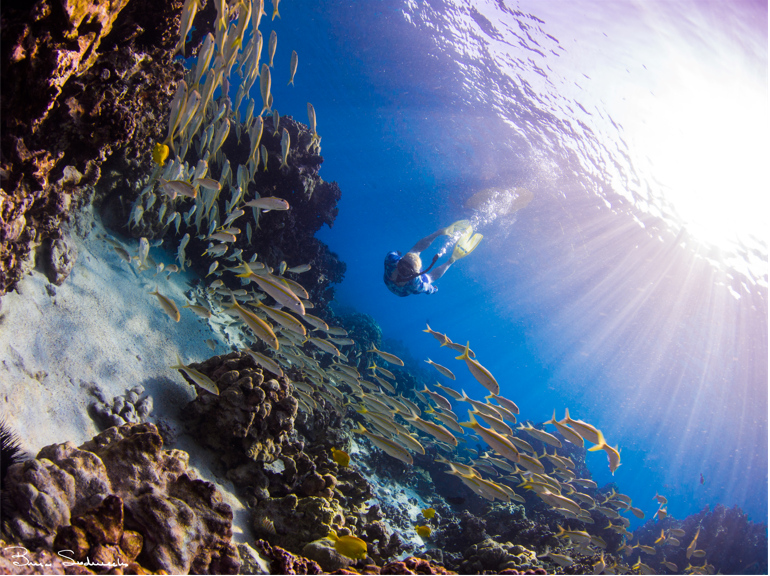
CHOW Plenary Deep Dive: Sea: The Future

Photo credit: NASA
A series of events in the 1960s and 70s gave rise to the birth of the modern environmental movement in the United States. In 1962, writer and marine biologist Rachel Carson published Silent Spring, which outlined the issue of pesticide pollution and its impact on wildlife. We saw our planet from space for the first time in the iconic 1968 Earthrise photo, which highlighted both the scale and the fragility of our one blue planet. A year later, the Santa Barbara oil spill caused destruction along the California coastline and the Cuyahoga River burned in the heartland of our country, drawing national media attention to the ongoing environmental crisis. In response, Earth Day was celebrated for the first time in 1970, and both the Environmental Protection Agency and the National Oceanic and Atmospheric Administration were founded that same year.
1972 was a year of critical change in the United States, that marked a turning point in our nation’s history. This year, inventions like the pocket calculator, home video game consoles, and color televisions became increasingly popular in American households. The space shuttle program was launched, as we looked to explore beyond our planet. Closer to home, however, the United States enacted a wave of landmark legislation that would provide the basis for the modern environmental movement in the United States and protect our ocean, coasts, and Great Lakes- the Clean Water Act, the Marine Mammal Protection Act, the Coastal Zone Management Act, and the National Marine Sanctuaries Act.
Since 1972, the Coastal Zone Management Act has preserved and protected our nation’s coastal resources. The Marine Mammal Protection Act worked to maintain the health of marine ecosystems and stopping the decline of marine mammal populations that depend on them, leading to the recovery of several species including humpback whales, gray seals, and California sea lions. The Clean Water Act’s focus is safeguarding water quality to protect drinking water, outdoor recreation activities like fishing and swimming, and the aesthetic, recreational, and economic value of our waters. Finally, the National Marine Sanctuaries Act authorized Congress to identify, designate, and manage areas of the marine environment which are of special national significance due to their conservation, recreational, ecological, historical, scientific, educational, cultural, archeological, or aesthetic qualities. As of May 2022, there have been 15 national marine sanctuaries and 2 marine national monuments designated across our ocean, coast, and Great Lakes that protect more than 620,000 square miles of waters.

Photo credit: Bruce Sudweeks
Fifty years later, our country and our waters now face new challenges as we work towards the conservation of our ocean and Great Lakes for future generations. Climate change, biodiversity loss, and coastal development are fundamentally changing marine and freshwater ecosystems. Managers and policymakers must navigate varying resource demands, manage different uses, and sustain livelihoods. Coastal communities face other issues including migration and displacement, loss of culture, and ensuring equitable access to nature and natural resources. Capitol Hill Ocean Week 2022 will look back at the beginning and forward to the future of how these Acts fundamentally changed how the United States manages marine, Great Lakes, and coastal environments and chart a course for the new policies and actions needed to shape our future.
Join us for Capitol Hill Ocean Week’s “Sea: The Future” plenary, sponsored by the Marine Mammal Commission, for this discussion. The panel will be moderated by Kris Sarri (National Marine Sanctuary Foundation) and features Francis Gray (Piscataway-Conoy Tribe), Dr. Frances Gulland (Marine Mammal Commission), Dr. Nikki Traylor-Knowles (Black Women in Ecology, Evolution, and Marine Science), Nell Minow (ValueEdge Advisor), Maya van Rossum (Green Amendments for the Generations), Michelle Bender (Earth Law Center), Dr. Kelsey Leonard (Shinnecock Nation), and Dr. Naomi Rose (Animal Welfare Institute), Steve Roady (Duke University School of Law), Ana Spalding (Oregon State University), Vidya Balasubramanyam (Coastal States Organization).
Mark your calendars for Tuesday, June 7th from 9 AM– 10:30 AM EST and register to join the conversation during Capitol Hill Ocean Week.
